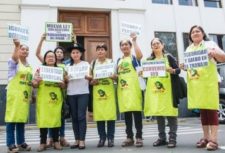Disclaimer: This article is more than 16 years old, and may not include the most up-to-date information or statistics. Please verify information with more recent sources as needed, and if you have any questions contact our Press Office.
11 May 2007
For the first time Thailand’s anti-slavery law has been enforced, despite slavery being widespread and having been a criminal offence for over 50 years.
On 25 April, Wipaporn Songmeesap was sentenced to seven years for enslaving a 13-year-old girl as a domestic worker, and three and a half years for inflicting severe physical harm. She was also ordered to pay the girl 200,000 baht (US$617) in compensation.
Chand (not her real name) was forced to work from 4.00am to midnight, seven days a week with no holiday. She had to carry out all domestic work for the family of five, including cooking all meals, cleaning, doing the laundry and washing the family cars. She received no pay and was only given two meals a day comprising cold rice with leftovers.
She was prohibited from leaving the house or contacting her parents and was regularly beaten.
After a year, Chand was returned to her village due to being ill as a result of her maltreatment. Shocked by her condition, the village head sent her to the local hospital.
Despite slavery being a criminal offence punishable by up to 10 years in prison, the law has never been applied. According to reports, this is largely due to there being no legal precedent to follow and police reluctance to recognise cases where people are in slave-like conditions without being chained as slavery.
This case marks an important step forward. It makes it more possible for future slavery cases to be tried as slavery rather than as lesser offences, as has been the case to date. It also increases understanding of the realities of modern-day slavery.
It is crucial governments make eradicating slavery a priority and enforce anti-slavery laws.





